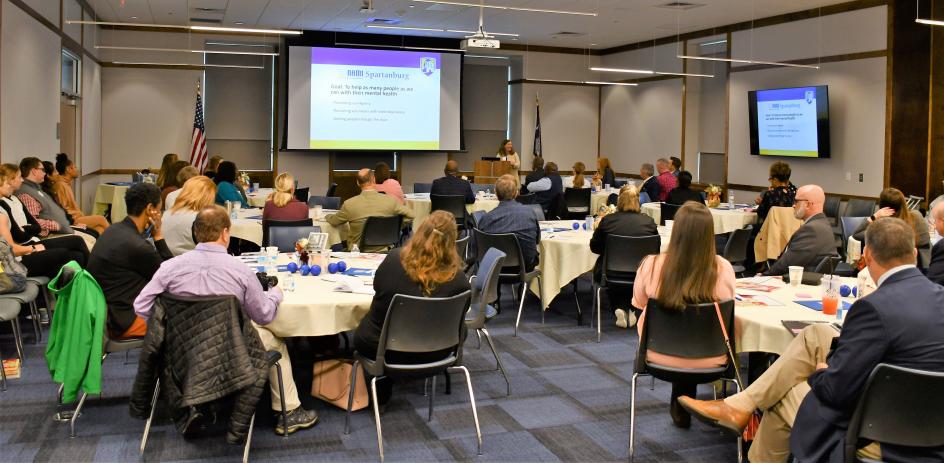November 15th, 2022
Challenges Facing Healthcare In Rural Areas Discussed At Summit Held At Limestone University

Community access to mental health services and healthcare providers loom as two of the major rural health challenges facing Cherokee County.
Those topics and more were discussed at the Rural Healthcare Summit hosted by Limestone University on Thursday, Nov. 10, inside the Hines & Riggins Center.
The Cherokee County School District has seen an unprecedented increase in the number of children needing mental health services for issues such as anxiety and depression. The district currently has eight mental health providers to serve students. It has added Limestone’s Game Changer and Emotional Vaccine programs through the National Center for Performance Health to increase access to licensed professionals that can help families with concerns about their child’s behavior.
“We currently have six full-time case workers in the school district that can serve our students, with parent permission,” said Bessie Westmoreland, director of student services in Cherokee County School District. “This really isn’t enough. We could really use at least one in every school.”
School attendance has become an issue for some children dealing with anxiety and depression issues. Those children often struggle academically when they do not spend time learning with classroom teachers.
“School is seen in some families as an option instead of a requirement,” Westmoreland said. “We can’t move the needle if we don’t have the thread in the classroom.”
Westmoreland was among 10 presenters who touched on the importance of mental health issues during the inaugural Rural Healthcare Summit.
The object of the panel discussion centered on identifying the rural health challenges facing Cherokee County and the surrounding area.
Spartanburg Regional Medical Center primary care practitioner Dr. Todd Morgan moved to Cherokee County in 1997 as community health doctor. He serves as co-medical director of Limestone athletic training.
Morgan estimates half of his current primary care involves mental health issues. An inability to deal properly with stress can lead to elevated blood pressure and other health problems.
“You can only deal with the physical aspects in conjunction with treatment of mental health,” Morgan said.
Organizations participating in the conference included Center for Family Medicine – Peachview, Cherokee County Commission on Alcohol and Drug Abuse, Cherokee Medical Center, Cherokee Community Care, Crescent Hospice, Edward Via College of Osteopathic Medicine (VCOM), KNOW(2), National Alliance on Mental Illness (Spartanburg Area), Palmetto Patriots Home, and ReGenesis Health Care.
The conference was sponsored by Duke Energy and Piedmont Natural Gas as part of Rural Health Week.
Small group discussions and a panel were held to discuss possible strategies to address issues such as substance abuse, vaccine hesitancy and a lack of services, such as substance treatment recovery centers and mental health support groups.
Limestone is currently involved in fundraising efforts to convert the former A.J. Eastwood Library building into a new nursing and health sciences facility. The university has hired additional faculty in the health sciences department and partnered with VCOM to provide another pathway for students to enter medical school.
The VCOM partnership will train additional community physicians to meet the needs of rural areas facing physician shortages to meet healthcare needs.
“In order for rural residents to have sufficient access, necessary and appropriate healthcare services must be available and obtainable in a timely manner,” Limestone University President Dr. Darrell Parker said.
“South Carolina continues to face a shortage of doctors and nurses. The development of Limestone’s nursing and health sciences programs will go a long way toward addressing the shortage.”
(Article by Scott Powell, The Gaffney Ledger: November 14, 2022).
